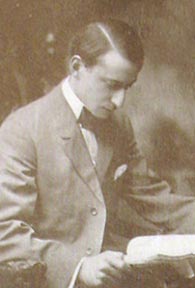Hugo Gernsback
From The Space Library
Contents |
Early Life
Born in the Bonnevoie neighbourhood of Luxembourg City, Gernsback emigrated to the United States in 1905 and later became a naturalized citizen. He married three times: to Rose Harvey in 1906, Dorothy Kantrowitz in 1921, and Mary Hancher in 1951. In 1925, Hugo founded radio station WRNY and was involved in the first television broadcasts. He is also considered a pioneer in amateur radio.
Before creating a literary genre, Gernsback was an entrepreneur in the electronics industry, importing radio parts from Europe to the United States and helping to popularize amateur "wireless". In April 1908 he founded a catalog to sell electrical components called Modern Electrics, it was the world's first magazine about electronics. Under its auspices, in January 1909, he founded the Wireless Association of America, which had 10,000 members within a year. In 1912, Gernsback said that he estimated 400,000 people in the U.S. were involved in amateur radio. In 1913, he founded a similar magazine, The Electrical Experimenter, which became Science and Invention in 1920, both would be notable for publishing many editorials by Gernsback and others about space science and astronomy. It was in these magazines that he began including scientific fiction stories alongside science journalism.
The Science Fiction Magazine
Gernsback started the modern genre of science fiction by founding the first magazine dedicated to it, Amazing Stories, in 1926. He said he became interested in the concept after reading a translation of the work of Percival Lowell as a child. He also played a key role in starting science fiction fandom, by publishing the addresses of people who wrote letters to his magazines. So, the science fiction fans began to organize, and became aware of themselves as a movement, a social force; this was probably decisive for the subsequent history of the genre. He also popularised the term “science fiction”, although he did not coin the phrase. Gernsback would hire David Lasser to edit Amazing Stories and Lasser would subsequently use Gernsback's printing resources to begin the publication of Astronautics magazine the journal of the American Interplanetary Society. Gernsback and Lasser would subsequently publish fiction and editorials by early rocket pioneers Max Valier, Laurence E. Manning, Nathaniel Schachner, Philip Ellaby Cleator, G. Edward Pendray and many other members of the American, German and British Interplanetary societies.
Books by Hugo Gernsback
Buy This Book Click here |
Buy This Book Click here |
Bankruptcy
In 1929, Gernsback lost ownership of his first magazines after a bankruptcy lawsuit. There is some debate about whether this process was genuine, manipulated by publisher Bernarr Macfadden, or was a Gernsback scheme to begin another company. After losing control of Amazing Stories, Gernsback founded two new science fiction magazines, Science Wonder Stories and Air Wonder Stories. A year later, due to Depression-era financial troubles, the two were merged together into Wonder Stories, which Gernsback continued to publish until 1936, when it was sold to Thrilling Publications and renamed Thrilling Wonder Stories. Gernsback was noted for sharp business practices, and for paying his writers extremely low fees. Gernsback returned in 1952-53 with Science-Fiction Plus.
Author
Gernsback wrote some fiction, including the novel Ralph 124C 41+ in 1911 (the title was a pun of the phrase "one to foresee for one"). Though hugely influential at the time, and filled with numerous science fiction ideas, the plot, characters, and writing strike most modern readers as shallow and old-fashioned. Gernsback combined his fiction and science into the popular Everyday Science and Mechanics magazine serving as the editor in the 1930's.
The Science Fiction Achievement awards, given to various works each year by vote of the members of the World Science Fiction Society, are named the "Hugos" after him. He was one of 1996's inaugural inductees into the Science Fiction and Fantasy Hall of Fame.
In 1917 he penned the story "The Scientific Adventure of Baron Munchhausen" a modern retelling of the German folk hero originally created by 18th century writer Rudolf Raspe. This story included such novel ideas as anti-static space suits to repel dust, tractor beams and bio-filters. The novel was never published outside of Gernsback’s popular magazine Electrical Experimenter until Apogee Books brought it back into the public eye.
Gernsback held 80 patents by the time of his death in New York City on August 19, 1967.



